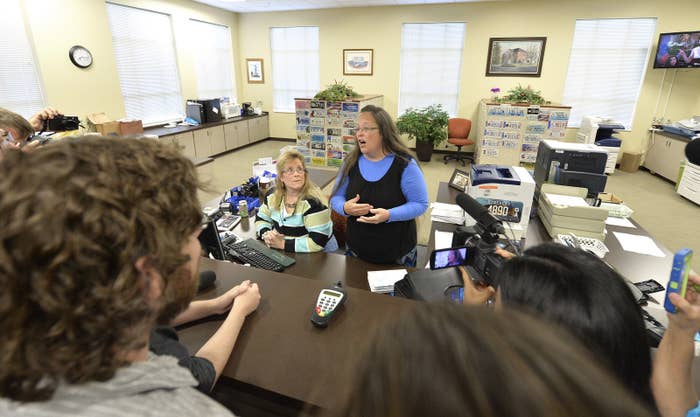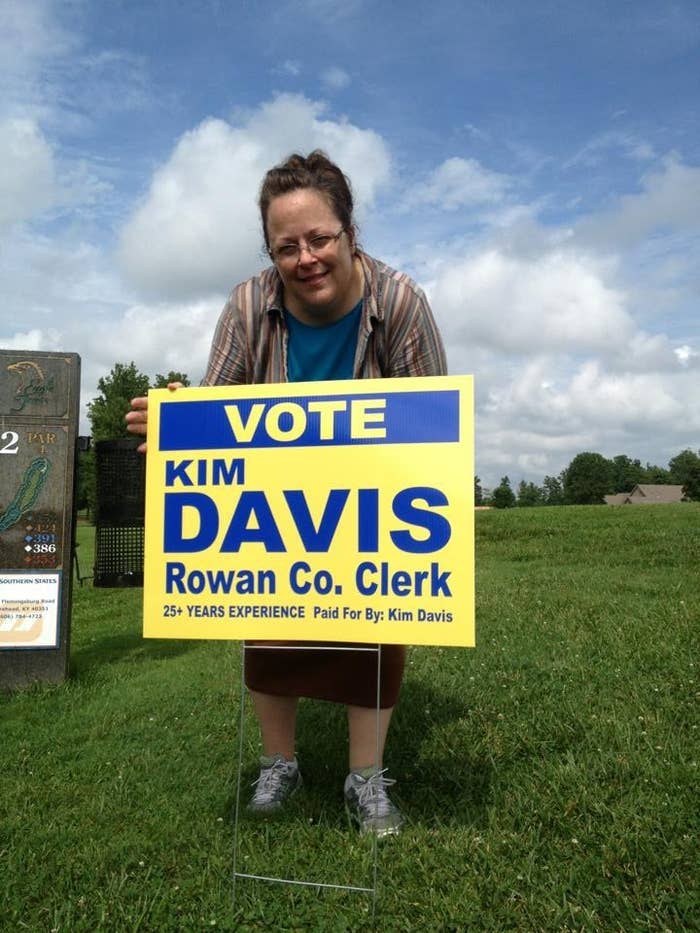
On the same day the Supreme Court issued its June 26 verdict legalizing same-sex marriage nationwide, the staff of the Rowan County Clerk's office in Kentucky issued what would be their last marriage license.
Shortly thereafter, clerk Kim Davis shut the doors, called her six staff members into a meeting, and explained a new policy she was implementing: They would no longer be issuing any marriage licenses to anyone in the county because of her religious objections to having her name appear on such documents for same-sex couples. The new policy applied to both same-sex and opposite-sex couples.
"I told [my staff] that we weren't going to be issuing license [sic], period, so we didn't discriminate against any party," Davis told a federal court in July.
But Davis's no-marriage-license policy, which is now the subject of intense legal and media focus following her continued refusal to obey the Supreme Court's ruling, had been in the making for many months, according to court transcripts reviewed by BuzzFeed News.
Shortly after she formally took office on Jan. 5 of this year, Davis met with Rowan County Judge Executive Walter Blevins, Jr, who acts as the de facto county mayor. "Kim and I have conversations," Blevins testified in court, "and she did tell me early
on, before the [Obergefell] decision was made, that if it was to allow same-sex marriage that she could not do that in her moral judgment. She just could not do it."
Weeks after taking office, she wrote to every state lawmaker whose email address she could find. "[I] asked them, pleaded with them to, while there was still time, to get a bill on the floor to help protect clerks who had a moral issue in this regard," she told the court of her Jan. 23 emails.
Correctly anticipating a win for same-sex marriage campaigners in the Supreme Court, she requested the lawmakers urgently begin planning legislation that would give county clerks the ability to exempt themselves from issuing marriage licenses.
"This is not something I decided because of this [Supreme Court] decision that came down," she said of her early efforts. "It was something that was a forethought and that I had prayed and fasted over weekly."
"So it wasn't just a spur-of-the-moment decision. It was thought-out and, you know, I sought God on it," she said.

Davis also told to the court that while she had been campaigning for office during the November 2014 election season, the issue of same-sex marriage had been looming in the background.
Charlotte Combess, who lost the Democratic nomination to Davis in May 2014, told BuzzFeed News the issue of what clerks would do in the event same-sex marriage was legalized never came up in either the primary or general election.
"We did have a debate, but there were no questions about gay marriage or anything of that nature. Basically, we were just asked about what we could do for Morehead," Combess said.
"If [Davis] knew about it, she was keeping it quiet," Combess said.
On the same day the Supreme Court issued its historic decision in June, Kentucky Gov. Steve Beshear sent a directive to county clerks in his state to begin complying with the decision.
But Davis told the court she had doubts the governor had intended to suggest clerks should issue same-sex marriage licenses in spite of their religious beliefs. She and other clerks soon wrote Beshear, urging him to call a special session of lawmakers or find another way to help clerks with religious objections.
"It appears the only timely and reasonable solution to this conflict is a legislative one," she wrote to the governor on July 8. "So for that reason, I respectfully request that you immediately call an extraordinary session of General Assembly to address the issues that have been caused in this transition from traditional marriage being redefined to include same-sex couples."
Davis told the court she never heard back from Beshear, but on July 9 the governor responded to Casey Davis, a Casey County clerk with religious objections, according to Beshear's office.
"I respect [Casey Davis's] right to his own personal beliefs regarding same-sex marriages," Beshear said. "However, when he was elected, he took a constitutional oath to uphold the United States Constitution."
Beshear's office told BuzzFeed News they received letters from 17 clerks requesting special session, but the governor rejected the requests because he did not want to waste taxpayer money.
"While there are two or three county court clerks still refusing to perform their duties, the rest of the county court clerks are complying with the law regardless of their personal beliefs," he said. "The courts and the voters will deal appropriately with the rest."
Davis told the U.S. District Court in July that although she had pledged to uphold the U.S. Constitution during her oath of office, she made no such pledge to abide by Supreme Court decisions.
"Who do you understand has the final say as to what the United States Constitution says?" a lawyer for the plaintiffs asked her.
"I don't know," Davis replied.
She told the court she believed the Supreme Court had "redefined marriage."
"But you understand when the Supreme Court says that, that's an issue of constitutional interpretation. That's the law of the land. You do understand that?" a lawyer asked.
"I suppose," Davis replied.
